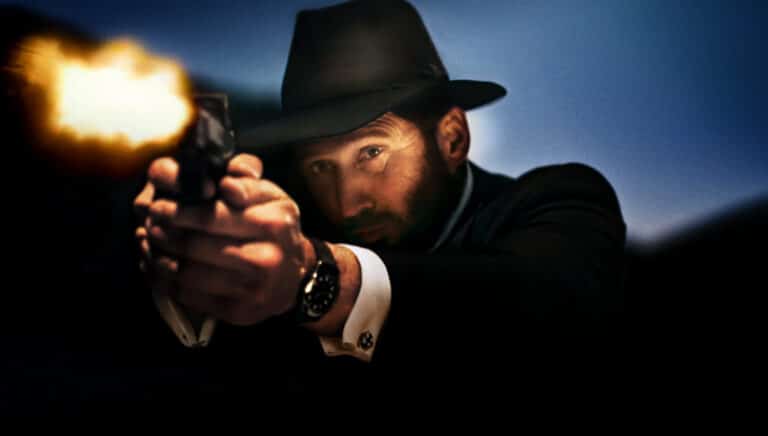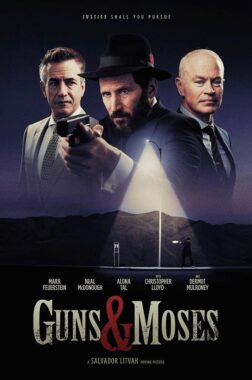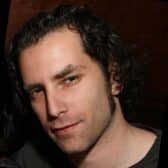
Jews on screen are rarely portrayed as physically tough. When they are, it’s usually in the form of Israeli soldiers, early 20th-century boxers, or mobsters like Meyer Lansky and Bugsy Siegel.
That limited portrayal is part of what inspired writer and director Salvador Litvak to create “Guns & Moses,” the new crime thriller following a gunslinging Orthodox rabbi that recently hit movie theaters across the nation.
In the film’s end credits, Litvak explains that the idea took root after the deadly shooting at the Chabad of Poway synagogue in California on April 27, 2019. The attack, carried out by white supremacist John T. Earnest, killed Lori Gilbert-Kaye and wounded Rabbi Yisroel Goldstein, shaking Jewish communities across the country.
A rabbi begins his own murder investigation
“Guns & Moses” is a thriller that begins when Rabbi Mo Zaltsman (Mark Feuerstein) attends a synagogue ceremony honoring prominent donor Alex Rosner (Dermot Mulroney). The celebration turns deadly when a gunman opens fire, killing one person, though no one sees who pulled the trigger.
Police quickly arrest Clay Gibbons (Jackson A. Dunn), a young white supremacist, for the shooting. But Rabbi Zaltsman isn’t convinced. After visiting Gibbons in custody and sensing inconsistencies, he begins his own investigation. As he digs deeper, Zaltsman uncovers signs of a larger conspiracy involving a valuable piece of land and potential corruption. His pursuit of the truth puts both him and his family in danger.
What follows is a tense whodunit, as Zaltsman works to unravel the mystery. With multiple suspects and growing threats, the film blends suspense with Jewish identity, challenging tropes of passivity and spotlighting a new kind of onscreen Jewish hero.

Christopher Lloyd steals the show as a Holocaust survivor
One of the film’s most powerful moments comes from Christopher Lloyd — best known for his role as Doc Brown in “Back to the Future” — in a rare dramatic turn as Holocaust survivor Sol Fassbinder. In the scene, Fassbinder confronts Gibbons, who espouses Holocaust denial.
At a time when the number of living Holocaust survivors is dwindling, the inclusion of such a scene feels especially urgent. Lloyd, often associated with eccentric or comedic roles, delivers a strikingly serious performance — restrained, emotional, and unforgettable. Though not Jewish himself, his casting in this role draws broader attention to the scene’s significance, and he handles it with unexpected depth.
While the end of the scene might feel somewhat heavy-handed, the moment still resonates. It’s not just about plot, but about memory, truth, and moral confrontation.
Great Jewish representation
It’s refreshing to see a mainstream film portray an Orthodox Jewish family with sincerity and respect — without caricature or cynicism. “Guns & Moses” doesn’t mock religious observance or turn Jewish identity into a punchline. Instead, it presents a community with depth, dignity, and a broad cast of Jewish characters, many played by Jewish actors.
Amazingly — and notably — the protagonist is not a schemer, a thief, or involved in a shady financial deal, as has often been the unfortunate trope in Hollywood depictions of religious Jews. Here, we get a character who is courageous, grounded, and morally driven.
The film also includes meaningful Jewish touchstones, like the beloved song “Kol Ha’olam Kulo,” based on a teaching by Rabbi Nachman of Breslov: “The whole world is a very narrow bridge, and the main thing is not to be afraid.” The scene where the family sings it together is one of emotional resonance, underscoring the film’s spiritual grounding.
Another strong detail: the rabbi’s wife doesn’t just stand on the sidelines. She trains alongside her husband in firearm use, a nod to empowerment, even if the logistics are a bit movie-fantasy. Sure, two training sessions won’t make someone a match for career gunmen, but this is, after all, fiction. And in the world of this story, it’s about the principle: standing up, together, against threats to the community.
Some problems with overacting — and a wild ending
While much of the cast turns in solid performances — including Feuerstein, who brings an affable charm to Rabbi Zaltsman, and strong supporting turns from Neal McDonough as the slick Mayor Donovan Kirk, Mulroney as Alex Rosner, and Paulo Costanzo as the secretive Sid Barofsky — the film is marred by moments of overacting and an implausible, overly dramatic ending.

Several performances feel either flat or overblown. Ed Quinn and Zach Villa, who play police officers involved in the investigation, seem to be phoning it in, delivering stiff and underwhelming performances that drag down key scenes. Gabrielle Ruiz’s character is one-note and quickly becomes grating, lacking any emotional nuance or development.
On the flip side, Michael B. Silver delivers a standout performance with limited screen time, a missed opportunity, as his presence could have brought more grounding to the film’s final act. Alona Tal also shines in a small but memorable role. And Jake Busey is surprisingly effective as a white supremacist father, bringing an unsettling intensity to his scenes.
That said, the film stumbles badly in its final stretch. The idea that Busey’s character and his son could go from hardened antisemites to singing a Chabad niggun (wordless melody) with Jews after a brief conversation is not just unrealistic — it borders on insulting. Redemption arcs are one thing, but this transformation strains all credibility. A surreal flashback involving a brownie only adds to the confusion and undercuts the emotional stakes of the climax.
Despite its strong intentions and moments of sharp writing, “Guns & Moses” suffers from tonal inconsistency, uneven performances, and an ending that feels too far-fetched to land.
Is “Guns & Moses” worth the watch?
“Guns & Moses” may not be a perfect film, but it’s absolutely worth watching, especially for what it represents. The cool factor of seeing Orthodox Jews as central, complex characters in a genre film can’t be overstated. In a media landscape that often reduces Jewish observance to background color or comic relief, this is a rare and meaningful shift.

It’s unclear why the fictional town of High Desert, California, was chosen as the setting instead of a real location with a history of antisemitic attacks, which might have added more emotional weight. Still, credit is due to writer-director Salvador Litvak for shepherding a film like this to completion in today’s political and cultural climate. That in itself is no small feat.
This isn’t a big-budget production, so the cinematography and effects aren’t on par with Hollywood blockbusters — and that’s OK. The strength of the film lies in its intention, not its polish.
There are missed opportunities: the rabbi could have been portrayed with more vulnerability, and the environmental subplot feels extraneous, especially when time could have been better spent exploring the roots and realities of antisemitism. A scene showing the rabbi inspiring other community leaders to train in self-defense would have been far more relevant and powerful.
Still, what “Guns & Moses” gets right is significant. It largely avoids tired Jewish clichés and presents a story where Jewish faith and identity are taken seriously. That alone makes it a step forward for Jewish representation on screen.
